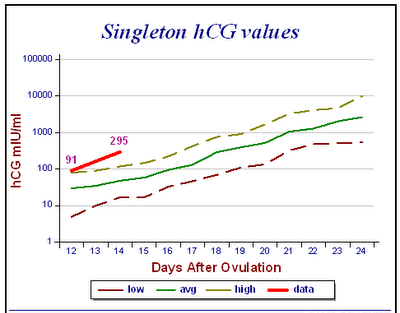Last menstrual period date:
What are Normal Beta hCG Levels? How this affects your pregnancy?
To confirm your pregnancy, your OB or midwife will order a Beta test. This is a blood test that measures the level of hCG, or human Chorionic Gonadotropin in your blood. After an egg is fertilized, it continues its journey down the fallopian tube and implants itself to the uterine wall. Once a successful implantation occurs, the placenta forms and your body begins producing this hormone. Many people have nicknamed hCG as the “pregnancy hormone” because only pregnant women produce it.
Normal beta hcg levels will double approximately every 2-3 days. Typically, rising levels of hCG signal a viable pregnancy. Eventually, this rapid influx of hormones tapers off and stabilizes around 11 weeks. Your body continues to produce the hormone throughout the pregnancy, but the levels typically decrease into the third trimester.
 Normal beta hCG levels can vary widely from woman to woman. The medical community typically looks at normal ranges rather than a specific level. Betabase is a wonderful resource for expecting mothers; this site gathers beta numbers and creates charts that match the days past ovulation to the lowest and highest levels of hCG reported. It then extrapolates the median hCG level. The final column shares the number of women reporting data for a specific day; this number is important in seeing how wide the range of “normal” may be for a particular day past ovulation. Betabase has compiled charts based on single, double, and triple pregnancies.
Normal beta hCG levels can vary widely from woman to woman. The medical community typically looks at normal ranges rather than a specific level. Betabase is a wonderful resource for expecting mothers; this site gathers beta numbers and creates charts that match the days past ovulation to the lowest and highest levels of hCG reported. It then extrapolates the median hCG level. The final column shares the number of women reporting data for a specific day; this number is important in seeing how wide the range of “normal” may be for a particular day past ovulation. Betabase has compiled charts based on single, double, and triple pregnancies.
It’s important to understand that normal readings fall within a very wide range. Knowing this ahead of time may help you avoid feeling panic when a girlfriend shares that at 10 days her number was 100,000 as compared to your 46,000. This difference is completely normal! That being said, here are the typical normal hCG levels:
v 3 weeks : 5 – 50 mIU/ml
v 4 weeks : 5 – 426 mIU/ml
v 5 weeks : 18 – 7,340 mIU/ml
v 6 weeks : 1,080 – 56,500 mIU/ml
v 7-8 weeks: 7,650 – 229,000 mIU/ml
v 9-12 weeks: 25,700- 288,000 mIU/ml
v 13-16 weeks: 13,300 – 254,00 mIU/ml
v 17-24 weeks: 4,060 – 165,400 mIU/ml
v 25-40 weeks: 3,640 – 117,000 mIU/ml
The mIU/ml unit stands for milli-international units per milliliter. A positive pregnancy test looks for levels above 25 mIU/ml.
As you can see from the chart, normal exists as a relative term. In the early stages of your pregnancy it’s more important that your normal beta hcg levels or numbers continually increase, rather than always being at the higher end of the range. Your doctor will likely only order a beta test to confirm your pregnancy; beta tests are not completed throughout your pregnancy unless an issue arises where knowing the hCG levels becomes important.
My content




